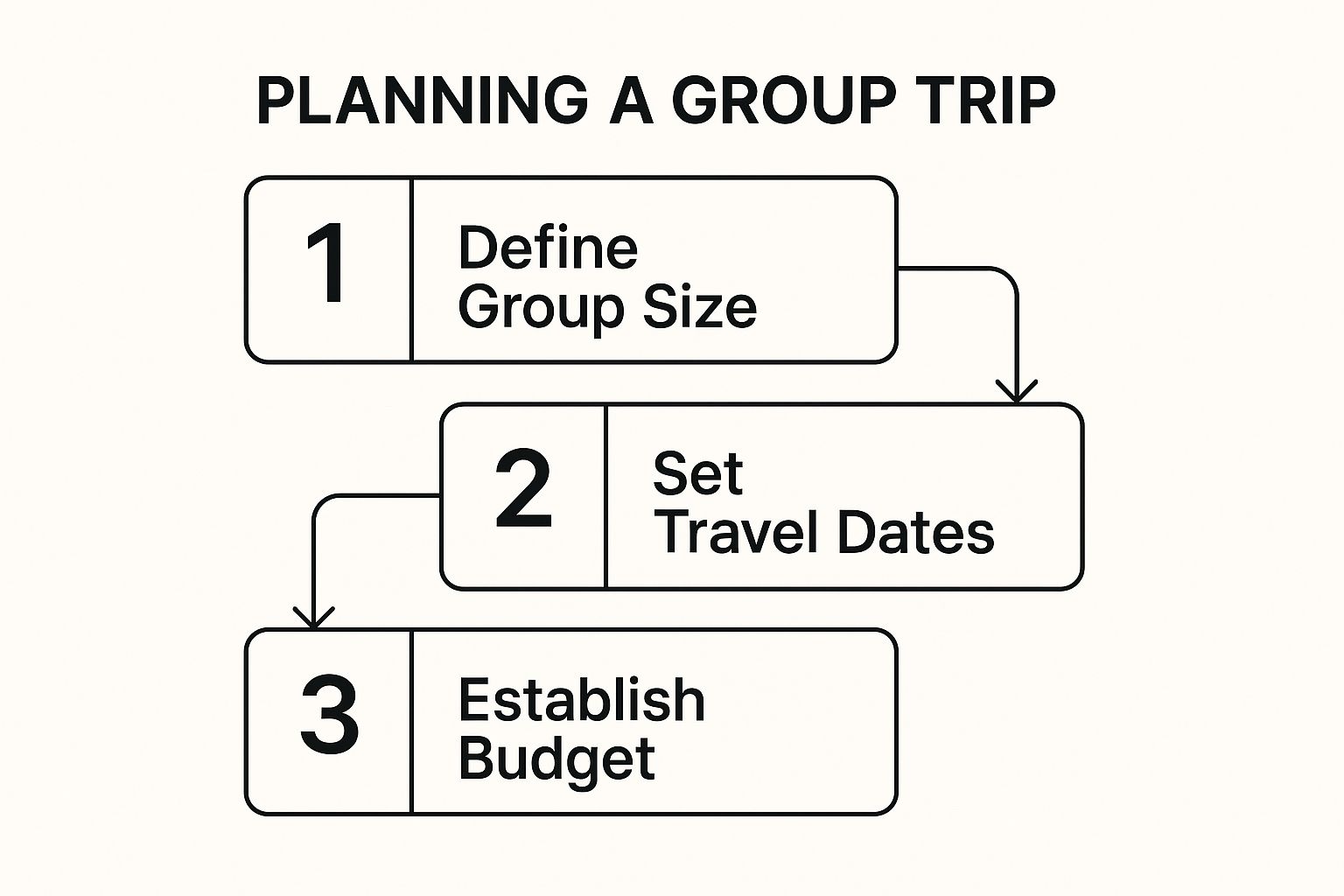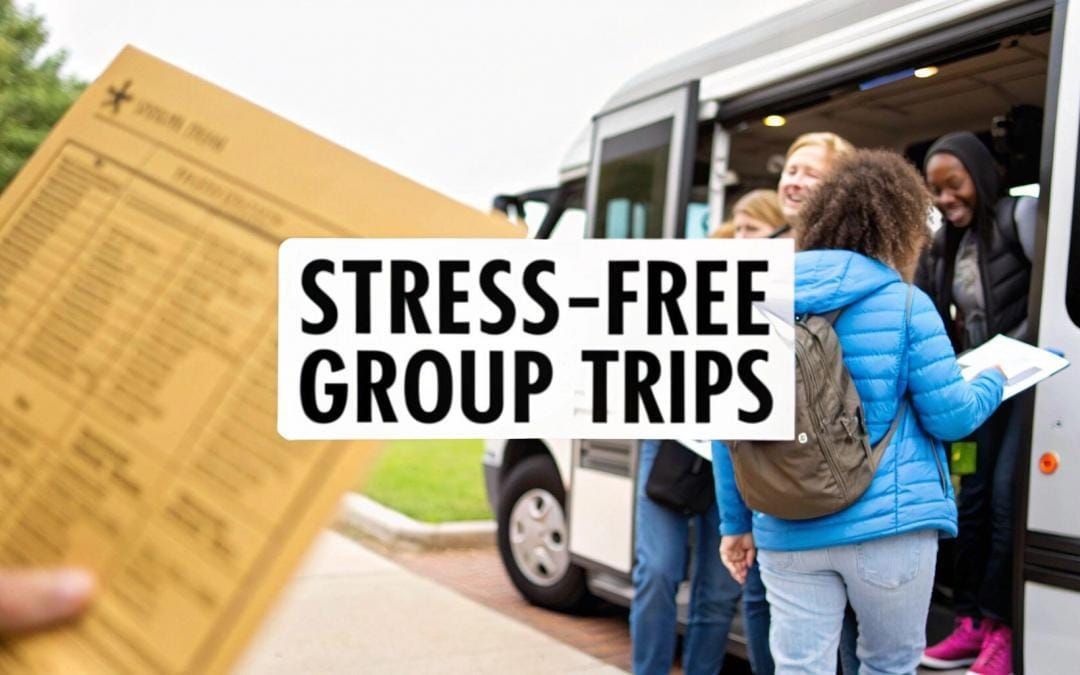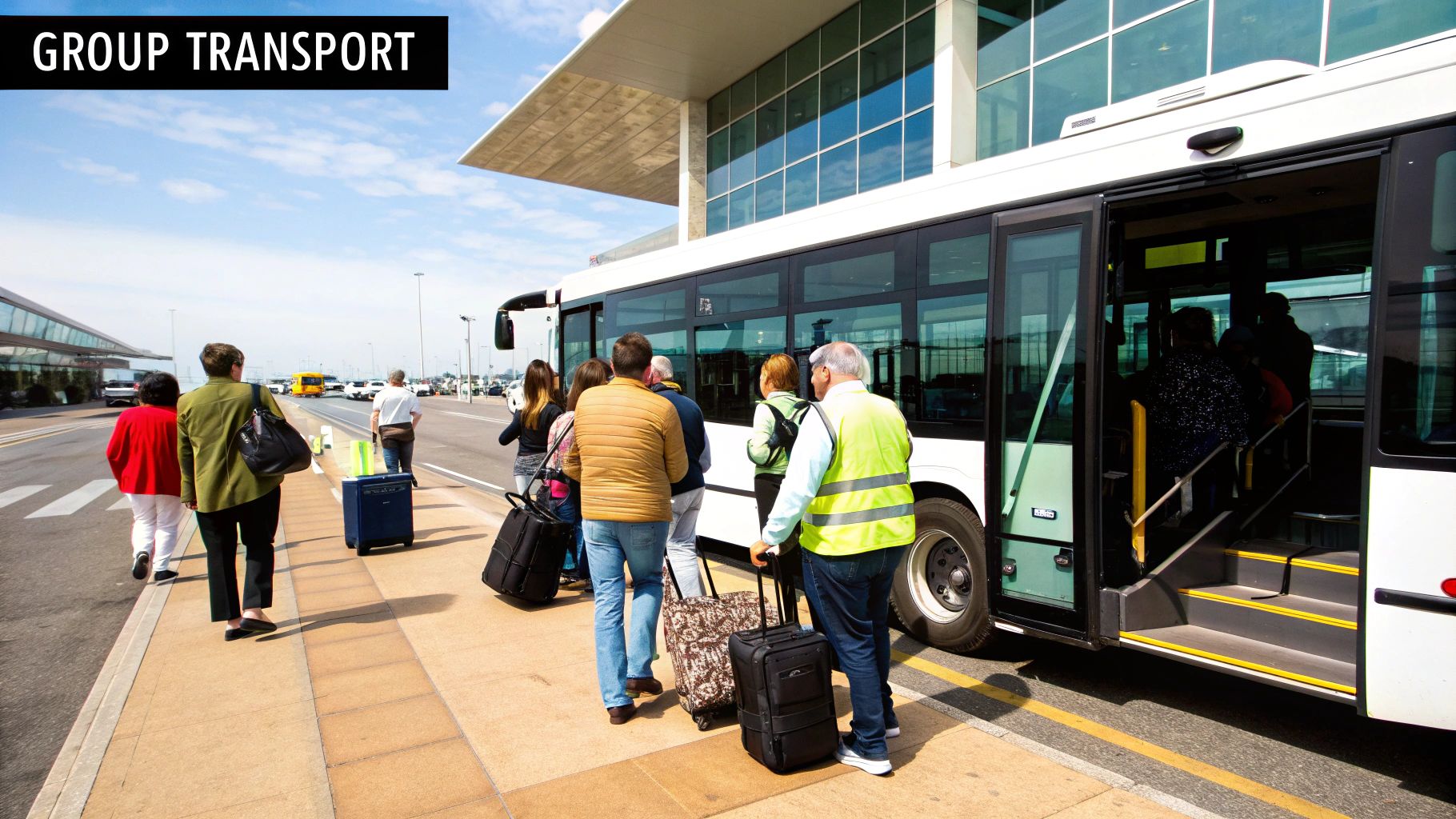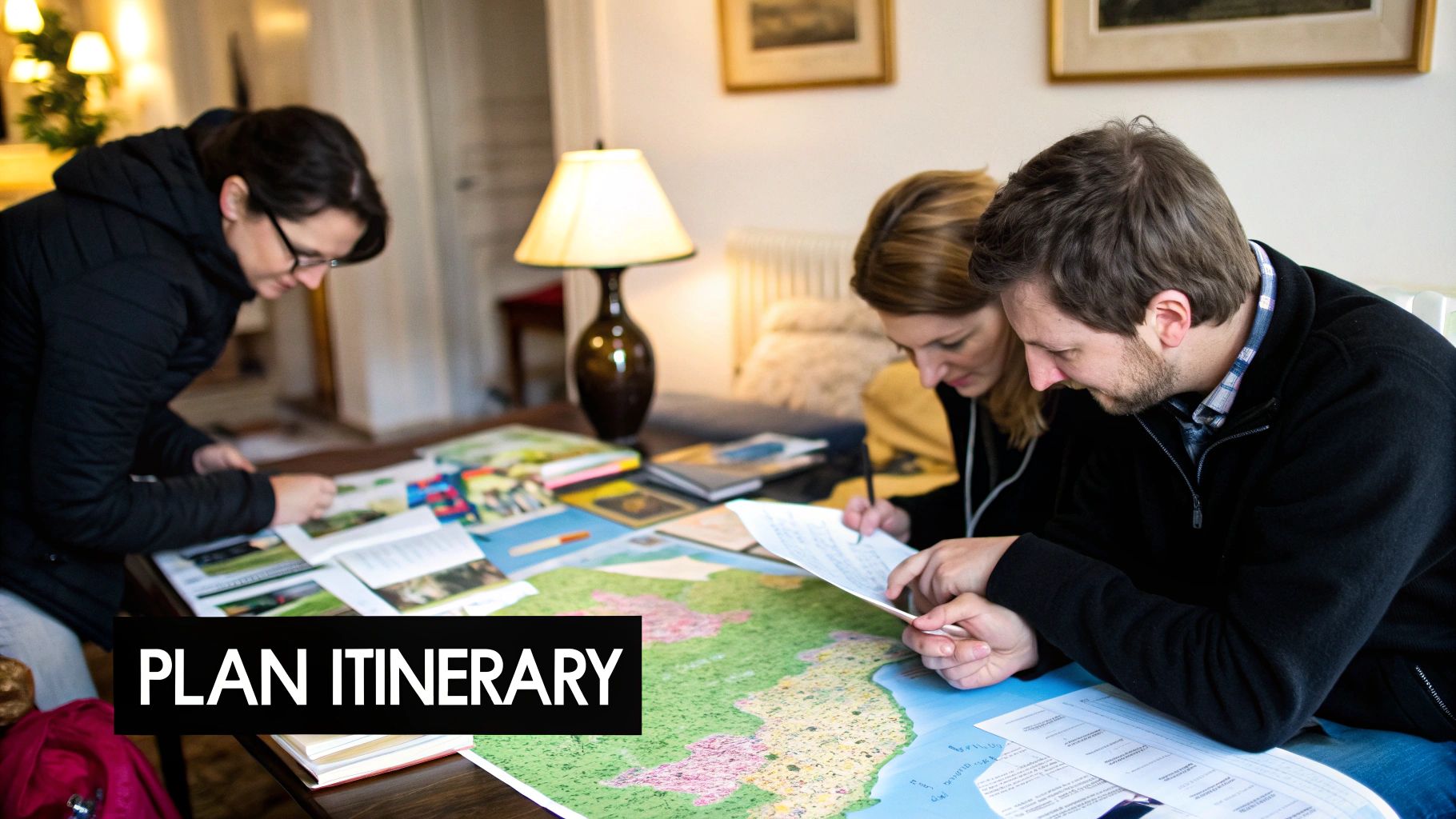Organising a group trip that everyone actually enjoys comes down to one thing: laying a solid foundation before a single penny is spent. Getting everyone on the same page about the trip’s purpose, budget, and dates from the get-go is the secret sauce. It’s this early work that saves you from the classic headaches of clashing expectations and money mix-ups later on.
Building the Foundation for Your Group Trip
The journey from a hopeful “we should all go away somewhere!” in the group chat to a properly organised adventure is a perilous one. This is where most plans fizzle out. If you want to succeed, you need to do the groundwork first.
Before you even start dreaming of destinations or activities, you have to nail down the why. Is this a chilled-out family reunion? A boisterous stag do? Or a structured corporate retreat? Knowing the answer shapes every single decision you’ll make. For example, planning a corporate outing has its own unique set of demands; you can find some great team building day ideas to get your creative juices flowing.
Gauging Interest and Getting Commitment
Once the purpose is clear, it’s time to see who is genuinely on board. A rookie mistake is taking every “I’m in!” at face value. To turn vague excitement into a solid plan, you need to introduce a small but meaningful hurdle: a deposit.
Asking for a small, refundable deposit of around £20-£50 is a game-changer. It’s not really about the money; it’s a simple filter that weeds out the dreamers from the doers. This one step firms up your group size, a crucial detail you’ll need for getting accurate quotes on everything from accommodation to transport.
A trip without a firm group size and a budget is just a conversation. An initial deposit transforms the abstract idea into a concrete project with a committed team.
Getting these core elements locked in early is the key to a smooth process.

This simple flow ensures that everyone has confirmed their availability and financial comfort level before you start making any non-refundable bookings.
Setting a Realistic Budget
With your core group locked in, it’s time for the money talk. It can feel a bit awkward, but skipping this conversation is a guaranteed recipe for disaster. The travel world has changed, and while outbound UK group travel is projected to reach 92 million trips in 2025, cost is now king.
In fact, a whopping 64% of UK adults say price is their top concern, and the average summer getaway has shrunk to about 8-9 days. This tells us that budgets need to be realistic and transparent.
A great way to handle this is to propose a few budget brackets (think: ‘savvy saver’, ‘comfort class’, ‘luxury’) and let people vote anonymously using a simple tool like Google Forms. It gives you an honest picture of what people are willing to spend without putting anyone on the spot.
To help you get started, here’s a quick checklist for your initial planning discussions.
Initial Group Trip Planning Checklist
This table breaks down the first essential steps. Getting these right from the outset ensures everyone is aligned and you have a clear brief to work from.
| Task | Objective | Key Consideration |
|---|---|---|
| Define Trip Purpose | Establish the ‘why’ behind the trip. | Is it for relaxation, adventure, celebration, or business? This dictates the entire vibe. |
| Gauge Commitment | Separate serious travellers from casual browsers. | Use a small, refundable deposit (£20-£50) to confirm numbers. |
| Set Travel Dates | Find a window that works for the majority. | Use a poll (e.g., Doodle) to find the best dates before booking anything. |
| Establish Budget Tiers | Understand the group’s financial comfort zone. | Propose 2-3 options (e.g., budget, mid, premium) and conduct an anonymous vote. |
| Outline Core Costs | Create a transparent list of expected expenses. | Your initial budget should cover accommodation, transport, key activities, food, and a contingency. |
At a minimum, your final budget should account for:
- Accommodation: Usually the biggest slice of the pie.
- Transport: This includes minibus hire, airport transfers, and getting around day-to-day.
- Key Activities: Any pre-booked tours or event tickets.
- Food Allowance: A rough daily estimate to guide people.
- Contingency Fund: Always add 10-15% for those just-in-case moments. You’ll thank yourself later!
By nailing down these fundamentals—purpose, commitment, and budget—you’re not just planning a trip; you’re building a solid framework for success. This structured approach to organising group travel clears up any confusion and gives you the confidence to move forward, making the planning process as stress-free as the holiday itself.
Crafting an Itinerary Everyone Will Enjoy
A great itinerary is the beating heart of a successful group trip. It’s the difference between a good holiday and an unforgettable one. I’ve learned to think of it less as a rigid, minute-by-minute schedule and more as a flexible framework—something that provides structure without killing spontaneity. The real goal is to balance exciting group activities with something just as precious: downtime.
The true art of organising group travel lies in blending these two elements. A jam-packed itinerary can quickly lead to exhaustion and grumbling, while too little structure can leave people feeling bored or adrift. The sweet spot is a schedule that feels full of possibility but never rushed. This approach acknowledges that not everyone wants to do the same thing all the time, which is just human nature.
Balancing Group Activities and Personal Freedom
From my experience, the most successful itineraries are built around a “hub and spoke” model. The ‘hub’ consists of the big-ticket items everyone agrees on—the core experiences that define the trip. The ‘spokes’ are optional activity blocks where people can choose their own adventure.
This simple method gives everyone a bit of ownership over their holiday. Say you’re planning a day trip to the Cotswolds. The ‘hub’ might be a mandatory group lunch at a classic pub. But the afternoon could offer a few ‘spokes’:
- For the active ones: A guided walk through the picturesque village of Bibury, perfect for photographers and keen walkers.
- For the browsers: Time to wander through the independent shops and tearooms in Bourton-on-the-Water.
- For the tired ones: Simply finding a comfy spot by the river to read a book and relax.
This structure brilliantly caters to different energy levels and interests, preventing the “one-size-fits-all” fatigue that can plague group trips. It empowers individuals and, just as importantly, reduces the pressure on you to be a constant source of entertainment.
Research and Smart Booking Strategies
Once you have a rough idea of what the group wants, the real planning begins. A common mistake I see people make is underestimating travel time. You look at a map, see two spots that seem close, and forget to factor in traffic, finding parking, or the simple logistics of herding 12 people from point A to point B.
Use a tool like Google Maps to get a baseline for travel times, and then add a 25% buffer. Seriously. If Maps says it’s a 40-minute drive, plan for an hour. This buffer is your best friend—it absorbs unexpected delays without throwing the whole day into chaos.
Booking in advance is absolutely non-negotiable for large groups. Turning up to a popular restaurant with 10 people and hoping for a table is a recipe for a long, hungry wait. The same goes for attractions; many now require pre-booked, timed entry slots.
When you’re researching, look beyond the obvious tourist traps. I find some of the best tips on local blogs, city-specific subreddits, or even travel planning websites like Visit London. They often reveal hidden gems and practical advice. And always, always check for group discounts. Many UK attractions, from historic castles to theme parks, offer reduced rates for groups of 10 or more, but you usually need to book these weeks ahead.
Creating a Shareable Digital Itinerary
To keep everyone on the same page, a shared digital itinerary is essential. Forget digging through long email chains or messy WhatsApp threads. A simple Google Doc or Sheet is an incredibly powerful tool for this.
A great digital itinerary should have:
- Centralised Information: All the addresses, booking confirmation numbers, contact details, and timings in one place.
- Live Links: Direct links to maps for navigation, restaurant menus, and attraction websites.
- Collaborative Access: Give everyone ‘view’ or ‘comment’ access so they can check details or ask questions directly on the document.
- A Clear Daily Breakdown: Organise the schedule day by day, clearly marking which activities are mandatory and which are optional.
For instance, a single day’s entry could be laid out like this:
| Time | Activity | Details | Status |
|---|---|---|---|
| 09:00 | Minibus Departure | Depart from hotel lobby. | Mandatory |
| 10:30 | Warwick Castle | Arrive for tour. Confirmation #12345. | Mandatory |
| 13:00 | Lunch | Group booking at The Rose & Crown. | Mandatory |
| 14:30 | Free Afternoon | Choose your activity. | Optional |
| 18:00 | Return to Hotel | Minibus departs from castle entrance. | Mandatory |
This format is scannable, clear, and gives everyone the necessary information at a glance. It becomes the single source of truth for the trip, cutting down on confusion and ensuring everyone knows what’s happening and when. Ultimately, a well-crafted itinerary is your roadmap to a seamless and brilliant group adventure.
How to Manage Group Finances Transparently
Let’s be honest, talking about money can be the trickiest part of planning any group trip. The good news? A clear, open system from the get-go takes the awkwardness out of it, ensuring everyone feels the process is fair and transparent.
The first thing to do is create a master budget. I’m not talking about a rough guess scribbled on a notepad; this needs to be a detailed breakdown that anticipates every possible expense. Think of it as your financial roadmap for the entire adventure.
Building Your Master Budget
A solid budget goes way beyond just the big-ticket items like flights and hotels. To avoid those last-minute “oh, we forgot about…” moments that cause real tension, you need to account for everything.
Your budget should clearly list:
- Accommodation: The total cost for your hotel, holiday rental, or apartments.
- Transportation: This covers your main travel, like a minibus hire, but also any local transport costs such as taxis or Tube passes.
- Pre-booked Activities: All the tours, attraction tickets, and entry fees you need to pay for in advance.
- Group Meals: Any dinners or lunches you plan to have together and pay for from a central pot.
- Contingency Fund: This is absolutely non-negotiable. I always recommend adding 10-15% of the total trip cost to cover the unexpected. A missed train, a sudden price hike, or an essential late-night taxi ride—this fund is your safety net.
A transparent budget, shared with everyone right from the start, is the single best tool for preventing financial friction. It sets clear expectations and shows every member of the group exactly where their money is going.
This upfront clarity is crucial for building trust, a key ingredient for any successful group trip.
Using Technology to Track Expenses
Gone are the days of scribbling IOUs on napkins or wrestling with a confusing spreadsheet trying to remember who paid for what. Modern apps do all the heavy lifting, keeping track of every penny in a simple, transparent way.
Apps like Splitwise are an absolute game-changer for group travel. Anyone in the group can log a shared expense as it happens. For instance, if one person covers a round of drinks, they just pop the amount into the app, and it automatically calculates what everyone owes. It even simplifies settling up at the end by figuring out the easiest way for everyone to pay each other back.
Other excellent options include:
- Monzo: This UK-based digital bank is brilliant for groups. You can create shared ‘Pots’ where everyone contributes money for communal expenses, or use its ‘Shared Tab’ feature to easily split individual bills.
- Splittr: Designed specifically for travel, this app even works offline, which is a lifesaver when you’re abroad without a reliable data connection. It lets you create separate reports for different trips and handles multiple currencies with ease.
Using one of these tools means you’re not stuck playing the role of the group accountant. You can actually relax and enjoy the holiday you worked so hard to plan.
Collecting Payments and Handling Issues
Once the budget is finalised, you need a straightforward plan for collecting the cash. Set firm but fair payment deadlines—a deposit to secure bookings and a final balance due date, for example. Make sure you communicate these dates clearly and send out friendly reminders a week or so before they’re due.
Last-minute dropouts are a common headache. Your best defence is having a clear cancellation policy laid out from the very beginning. Explain that deposits become non-refundable after a certain date, as they will have already been used to secure reservations. If someone has to pull out after the final payment has been made, their spot is already paid for.
Having this policy protects the rest of the group from having to unexpectedly cover the shortfall. It’s also why you should make sure everyone has personal cover; learning more about the importance of group travel insurance can provide essential peace of mind. That way, a personal emergency doesn’t have to become a financial crisis for the entire group.
Solving the Group Transportation Puzzle
Getting your group from A to B smoothly is more than just logistics; it’s a massive win that sets the tone for the entire trip. When transport goes wrong, the whole day feels chaotic. Get it right, and the adventure begins the moment everyone climbs aboard.
This part of organising a group trip can feel like a complex puzzle, but it really doesn’t have to be. For most UK journeys, the smartest move is often hiring a minibus with a professional driver. It simplifies everything from the schedule to the costs and, best of all, turns travel time into quality social time.
The Real Cost of Different Transport Options
At first glance, organising a convoy of cars or navigating the UK’s public transport network might seem like the cheaper way to go. But when you look at the total cost, a different story emerges. It’s not just about the price of a train ticket or a tank of petrol; it’s all the hidden costs and hassles that really add up.
Let’s run the numbers for a realistic day trip—say, a group of 12 heading from London to Bath.
Option 1: The Car Convoy
- What it involves: You’ll need at least three separate cars, which means finding three designated drivers who can’t fully relax and enjoy themselves. Meticulous coordination is a must.
- Hidden costs: You’re looking at multiple fuel payments, city-centre parking fees (which can be extortionate in a place like Bath), and potential clean air zone charges.
- The hassle factor: There’s the stress of navigating busy motorways, the real risk of someone getting lost, and the near-impossible challenge of finding multiple parking spaces together.
Option 2: The Public Transport Juggle
- What it involves: Booking 12 individual train tickets, often at wildly different prices if you’re not quick. Then you have to figure out how to get from the station to your final destination, which means more planning and more cost for taxis or local buses.
- Hidden costs: Peak-time travel can make train fares surprisingly expensive. Once you add the cost of taxis at your destination, the budget quickly inflates.
- The hassle factor: You’re tied to strict timetables, so there’s no room for spontaneity. A missed connection can derail the entire day, and herding a group through a busy station is an art form in itself.
Option 3: Private Minibus Hire
- What it involves: One simple booking, one single payment.
- Hidden costs: Virtually none. A reputable company provides an all-inclusive quote covering the driver, fuel, and door-to-door service.
- The hassle factor: Minimal. Everyone travels together, luggage is securely stowed away, and you get dropped right at the entrance of your destination. No fuss.
When you divide the single, fixed cost of a minibus by the number of passengers, it frequently emerges as the most economical and stress-free solution for groups of eight or more.
Choosing the Right Minibus Hire Company
I’ve learned from experience that not all minibus services are created equal. When you’re entrusting a company with your group’s safety and schedule, you need to do a little homework. This isn’t just about chasing the cheapest quote; it’s about securing reliability and, frankly, your own peace of mind.
Here’s what I always look for when vetting a provider:
- Driver Professionalism: Are the drivers DBS-checked? Do they have excellent local knowledge? A great driver is more than just a navigator; they can be a real asset to your trip.
- Vehicle Quality and Safety: Don’t be shy—ask about the age and maintenance schedule of their fleet. The vehicles should be modern, clean, and regularly serviced to the highest standards.
- Transparent Pricing: You want a fixed, no-obligation quote with zero surprise fees. All costs, including potential parking or tolls, should be crystal clear from the start.
- Flexibility and Service: Can they handle a few different pick-up points or add an impromptu stop? A good company will work with you to build the perfect travel plan, not force you into a rigid box.
This attention to detail is more important than ever. The UK’s tourism sector is bouncing back in a big way. Projections show foreign visits could hit a record 12.5 million in the third quarter of 2025 alone, the highest since before the pandemic. I came across this detail in a UK inbound tourism statistics report, and it was a real eye-opener.
This boom means that booking reliable transport well in advance is no longer a suggestion—it’s essential.
Ultimately, having a single, dedicated vehicle does more than just simplify logistics. It creates a mobile ‘base camp’ for your group, a secure place for belongings, and a private social space where the fun can continue between destinations. By solving the transport puzzle smartly, you lay the groundwork for a truly memorable group experience.
Keeping the Trip on Track in Real Time
All that meticulous planning? That was the hard part. Now that you’re actually on the road, your role changes from architect to conductor. You’re no longer just managing bookings and spreadsheets; you’re leading the live performance, steering the group through the journey itself. It’s all about real-time communication and being nimble on your feet.
The best way to kick things off is with a quick pre-departure huddle. This doesn’t need to be a formal boardroom meeting. A quick chat on the minibus as you’re pulling away or a five-minute briefing at the station is perfect.
This is your moment to confirm the first stop, share the coach’s Wi-Fi password, and hand out any physical tickets. It’s a simple gesture that makes everyone feel clued in and sets a fantastic, collaborative tone for the whole trip.
The Power of Instant Communication
From my experience, the single most valuable tool for keeping a group in sync is a dedicated chat group. A simple WhatsApp or Signal group is all you need. It effectively becomes the trip’s digital nervous system, making it easy to send out updates that reach everyone instantly.
Think of it as your command centre for all the little things:
- Morning Rally Cries: “Morning all! The minibus leaves at 9:15 am sharp. Don’t forget your waterproofs!”
- Live Location Drops: Dropping a pin to show the meeting point for lunch or a fantastic photo spot you’ve just stumbled upon.
- Quick Polls: “Dinner tonight: pizza or pub grub? React with a 👍 or a 🍺!”
- A Shared Photo Album: It’s brilliant for building camaraderie as everyone posts their snaps throughout the day, creating a living memory of the trip.
This digital hub is indispensable. It cuts out the chaos of trying to update people one-by-one and ensures that crucial information lands with everyone at the same time.
Honestly, it’s your secret weapon for keeping the group moving as one unit, especially when you’re navigating a bustling city centre or a crowded attraction.
Navigating Hiccups and Disagreements
Let’s be realistic: no matter how perfectly you plan, things can go sideways. A train gets delayed, a restaurant loses your booking, or two members of the group have a polite but firm disagreement about how to spend the afternoon. The way you handle these moments is what truly defines your role as the group’s leader.
The key is to stay calm and project confidence. When a problem pops up, everyone will instinctively look to you. Take a breath, figure out what’s happening, and then offer a clear solution or a couple of options. You’re a facilitator, not a dictator.
This is especially true when you consider how busy the UK is becoming. VisitBritain’s latest forecast anticipates 43.4 million visits in 2025, with tourists spending a record £33.7 billion. For group organisers, this means busier attractions and more competition for services, making those little hiccups all the more likely. Reading the official UK tourism forecast can give you a better sense of what to expect.
When disagreements bubble up, listen to both sides and look for the middle ground. Often, this is where that “hub and spoke” itinerary you planned earlier comes in handy. If half the group wants to see another museum but the other half is desperate for a coffee break, empower them to split up. “Okay, Team Museum, we’ll meet you back at the hotel lobby at 5 pm. Team Caffeine, enjoy the break!”
On-Trip Problem Solving Guide
Having a plan for common problems before they happen can be a lifesaver. Here’s a quick-reference guide I’ve put together from years of experience for handling on-the-go issues with a cool head.
| Common Issue | Proactive Solution | Reactive Strategy |
|---|---|---|
| Missed Connection | Always build a 25% time buffer into travel plans. Share digital tickets in the group chat well in advance. | Immediately check for the next available train/bus. Use the group kitty to cover new tickets if needed. |
| Group Disagreement | Offer optional activities in the itinerary to give people built-in choices and a sense of autonomy. | Mediate a compromise. Suggest splitting up for an hour or two with a clear time and place to regroup. |
| Unexpected Closure | Have a solid ‘Plan B’ for key attractions. Research a nearby alternative during the planning phase. | Use your phone to quickly find a different spot nearby. Frame it as a fun, spontaneous change of plans. |
| Someone is Unwell | Ensure everyone has travel insurance details handy. Carry a small first-aid kit with plasters, painkillers, etc. | Help them get what they need, whether it’s a pharmacy or just some quiet time. Adjust the day’s plan if required. |
Ultimately, your role on the ground is all about flexibility. You need to know when to stick to the schedule because a crucial booking depends on it, but also know when to ditch the plan for a spontaneous, memory-making opportunity. Your ability to read the group’s energy and make confident calls is what will turn a good trip into a truly brilliant one.
Your Group Travel Questions Answered
Even the most organised group trips have their wobbles. No matter how much you plan, a few tricky questions and last-minute panics always seem to find their way in. The trick is not to avoid them—that’s impossible—but to have a game plan ready before they happen.
I’ve been there, and I’ve seen it all. From last-minute dropouts to arguments over sightseeing, these are the real-world problems that can sour a great trip. Here’s how I’ve learned to navigate them, keeping stress low and spirits high.
What Is the Best Way to Handle Last-Minute Cancellations?
Ah, the classic nightmare for any group organiser. The truth is, the best way to handle a cancellation is to have planned for it from day one. It’s all about prevention.
Before anyone even commits, you must set out a crystal-clear payment schedule. This isn’t just about the total cost; it needs to include dates for non-refundable deposits and a final, firm payment deadline. Put it all in writing and make sure everyone gets a copy. If someone drops out after you’ve paid the final bills to suppliers, their spot is paid for. You are under no obligation to refund them out of your own pocket.
Having a written payment and cancellation policy isn’t about being harsh; it’s about being fair to the rest of the group. It protects everyone from sudden cost increases and ensures the financial burden of one person’s change of plans doesn’t fall on everyone else.
Of course, if you can find someone to take their place, you can happily offer a refund to the person who cancelled. But if not, you might need to recalculate shared costs like accommodation or minibus hire. This is exactly where that 10-15% contingency fund I mentioned earlier becomes a lifesaver.
How Do You Plan for a Group with Mixed Interests?
Forcing a group of individuals with different tastes into a rigid, one-size-fits-all itinerary is a surefire recipe for disaster. The secret isn’t forcing togetherness; it’s offering choices. I’ve always found a ‘hub and spoke’ model works wonders here.
The ‘hub’ is your core, non-negotiable stuff that everyone does together—think of a key sightseeing tour or a big celebratory meal. The ‘spokes’ are the optional activities where people can split off and do their own thing.
For example, an afternoon could break down into a few different paths:
- A guided historical walk for the history buffs.
- A couple of hours of free time for shopping or wandering through local markets.
- A chilled-out afternoon at a park or a cosy café for those who need a break.
A simple poll using something like Google Forms during the early planning stages is a brilliant way to see what people actually want to do. It lets you build a trip that caters to the majority while still giving everyone the freedom to enjoy it in their own way.
How Far Ahead Should I Organise a UK Group Trip?
For any decent-sized group trip within the UK, you should be thinking 6 to 9 months in advance. I know that sounds like a long time, but it’s absolutely essential, especially if your dates fall during peak season like summer, school holidays, or a bank holiday weekend.
The best accommodation and transport deals are the first to go. Booking well ahead doesn’t just get you better prices; it gives your group plenty of time to get time off work approved, save the necessary funds, and mentally commit to the trip. For a simple weekend away with a few friends, 3-4 months might be fine, but for anything over 10 people or lasting several days, early planning is your best friend.
This is especially true when it comes to sorting your transport. When you’re ready to look into group travel in London or further afield, getting quotes in early secures your vehicle and locks in a better rate. Leaving it late often means paying more for fewer options, which is a headache you just don’t need.



